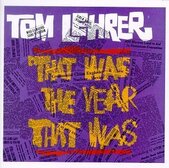weekly column
|
Each week, find a commentary on something connected to verses of Torah or another source of wisdom
|
|
Each week, find a commentary on something connected to verses of Torah or another source of wisdom
|
 Wisdom Wherever You Find It Oh, the Protestants hate the Catholics, and the Catholics hate the Protestants, and the Hindus hate the Muslims, and everybody hates the Jews. Tom Lehrer It’s the big laugh line in a sardonically hysterical song – “National Brotherhood Week.” Tom Lehrer satirizes the artifice constructed (and later abandoned) to pretend that we can all just get along. Rich and poor, Black and White, New Yorkers and Puerto Ricans are all at odds, and in recordings of his performances of this song you can hear the uncomfortable laughter of recognition from the audience beneath the tinkling of the piano. And then comes the big laugh line, sung by the Jewish math professor with the wicked insight. The speech and drama team from Evanston High School (with whom my own New Trier team shared a bus) loved to sing this song on the way to tournaments. I must have heard it fifty times over the years, and each time the lyric in question was sung with particular gusto, followed by laughter that mystified me because all those kids had sung it themselves so many times. And so many of them were Jews! I was fortunate to have a rich Jewish upbringing and a home in which the customs, rituals and values of Judaism were central. I won’t say that everything positive in my life had a Jewish element to it, but almost every Jewish element in my life was positive. (Except fasting. Hated it then, hate it now.) Even the devastation I felt as I learned about the Holocaust and other tragedies before and since came with a certain lack of comprehension about why it seemed that everybody hates the Jews. Eventually I lost patience with the hatred and decided I was unwilling simply to ignore it. I will admit to some small pleasure in watching people wriggle uncomfortably when they were confronted for intentional bigotry (like the young woman who asked if she could “Jew me down” on the price of a waterbed I was selling) or for bias of which they were unaware (like the use of “Pharisee” as a pejorative). Ironically, it was my own evolution on the subject of intermarriage between Jews and non-Jews that set me free from my own constant worry about the persistence of Jew-hatred. Here’s how it went. At first, I believed that the marriage between a Jew and a non-Jew was a betrayal of the Jew’s identity. Then, I came to believe it was a threat to the future of the Jewish people. Then, as I realized that for every Jew who married “out of” their tradition, a non-Jew also married “out of” their tradition, I understood that those marriages were overwhelmingly factual rather than political statements for both families. And at this point in my life, I understand that the prevalence of intermarriage (and the embrace of Jewish partners by non-Jewish families) means that there are more people who love Jews than hate us. And setting aside everything else about intermarriage (just do me the rhetorical favor, please), that evolution in my thinking has persuaded me that while some people are haters, it is most certainly not the case that everybody hates the Jews. Do you think you know where I am going? You probably do not. There is without doubt still antisemitism in the world, and a lot of it. But I cannot think of a worse reason to cling to a personal Jewish identity than the idea, promoted by too many Jewish organizations explicitly and implicitly, that people will hate you for it anyway, so you might as well embrace it. That attitude is only one small tick above the pathetic adage popular among some Jews, “scratch a gentile and you will find an antisemite.” Not every act of antagonism – including violence – that has a Jewish victim is motivated by antisemitism. Yet the intensity with which the accusation is leveled says more about the accuser than the perpetrator. The condemnable shooting in Highland Park, Illinois on the Fourth of July 2022 is a notable example. The murderer grew up blocks away from the site of the crime, had difficulties with local law enforcement and a variety of residents, and fired randomly into a crowd, murdering seven (two of whom were Jewish) and then headed to Wisconsin expecting to shoot up another town with a smaller Jewish population. But because Highland Park has a large Jewish population, the speculation that the shooter was after the Jews was dominant, especially in the Jewish press. And I write these words as a proud Jew, unafraid of being identified as such. And not every attack on the State of Israel is motivated by Jew-hatred either. (At this point, I am almost obligated to include the phrase “but some certainly are” lest I be accused of minimizing the problem.) The insistence of some individuals and groups to equate being opposed to Israel’s conduct or policies with being opposed to Jews strikes me as a desperate attempt to frighten Jews to remain in or reenter the fold. And I write these words as a proud Zionist, unafraid of being identified as such. I still laugh at Tom Lehrer’s lyrics even as a I still wonder, more than half a century later, at the enthusiasm of the Evanston HS forensics team for them. But not everybody hates the Jews. We should save our outrage for those who actually do.
0 Comments
 Wisdom Wherever You Find It Here, I am just about seventy years old. Rabbi Elazar Ben Azariah For some things, you have to wait a lifetime. I have attended Passover seders from before I can remember, and at each one, this incidental remark by an ancient sage was part of the telling of the Exodus. It is not clear if the rabbi was indeed 69 or if his reference is to the presumed “years of a person’s life” mentioned in Psalm 90 (“eighty if granted the strength”). Whichever it is, the point of his remark is the same – it is never too late to learn something new. Whatever the case, for the first and only time, when I recited this sentence this past spring, I was just about seventy years old, quite literally. There have been other milestones of recognition in my life (and I have written about them), but this one reaches farther back into my own history than any other. It is also a destination which I have measured, incrementally by the year, from the unimaginable to the inevitable to the immediate. I have always cautioned people not to take the numbering of years in the Bible too seriously. I guess it is possible that people used to live for 400 or 600 years, or that the Israelites wandered exactly 40 years between the Exodus and the Promised Land, but I don’t think so. If I take those numbers as completely accurate then I have to take every representation in Scripture as literally true, and I have resisted such an abandonment of logic and intellect for too long to turn back now. After all, here, I am just about seventy years old. Besides, if the Bible is literally and completely true and accurate, there is nothing to learn from it. Maybe that sounds ridiculous when I express it so explicitly, but it is the conclusion that the architects of my own Jewish tradition reached an exceedingly long time ago. We posit two corpuses of Torah, one which is written (maybe the Five Books of Moses, but perhaps the entirety of the Bible – even though some of the Bible, like the Book of Psalms, is attributed to human authors) and the other of which is oral (at least the Talmud and interpretive literature called midrash, and some say every commentary and conversation about Torah from the closure of the canon until your eyes scanning this column). Sitting in this 58th century since the creation of the world (according to the Bible – again, I caution taking it too literally), I look back across the millennia and recognize that there have always been people who yearn for the authority of literalness. The plain contrast between true and false, authentic and manufactured, godly and sinful is very appealing, but it is simply unknowable. The believers in absolute certitude of meaning and intent in every era have either disappeared or evolved, thus destroying their claim to certitude. It is always the interpreters who survive, though not always their particular interpretations. What is true about the holy and venerated Torah which has a source in the divine fabric of existence is at least equally true about documents that were inarguably produced by human beings. For the sake of illustration, I will choose one: the Constitution of the United States. The oldest person to sign its ratification was Benjamin Franklin at 81. The youngest was Jonathan Dayton at 26. The primary author was James Madison. When he completed the task, he was 36. Of the fifty-five delegates to the Constitutional Convention, all but one – Franklin – were under 70, and all but a handful were a long way from it. They could not have been smart enough or old enough to have intended their words to cover every future circumstance. The immutability of text is alluring in every belief system. It removes the responsibility of the reader to do anything other than cite sacred words as a justification for belief and behavior. But it is never true, not immediately after the text is written and increasingly with every day that passes. Things change, words acquire new meanings and lose old ones, and the reader/listener/student who was once 26 eventually becomes 81. It is never too late to learn something new. The rabbi who first proclaimed, “here, I am just about seventy years old” was acknowledging that the story of the Exodus should be told at night, not only during the day. Pulling an all-nighter on Passover seems a pretty small lesson for someone who is almost seventy. (Honestly, I have trouble making it much past ten o’clock these days.) It seems almost incidental. But if the small lessons can still be learned that late in life, then I think there are larger lessons an old dude like me can yet learn from the presumed “original meaning” of the Torah. And the Constitution. |
Archives
October 2023
Categories |